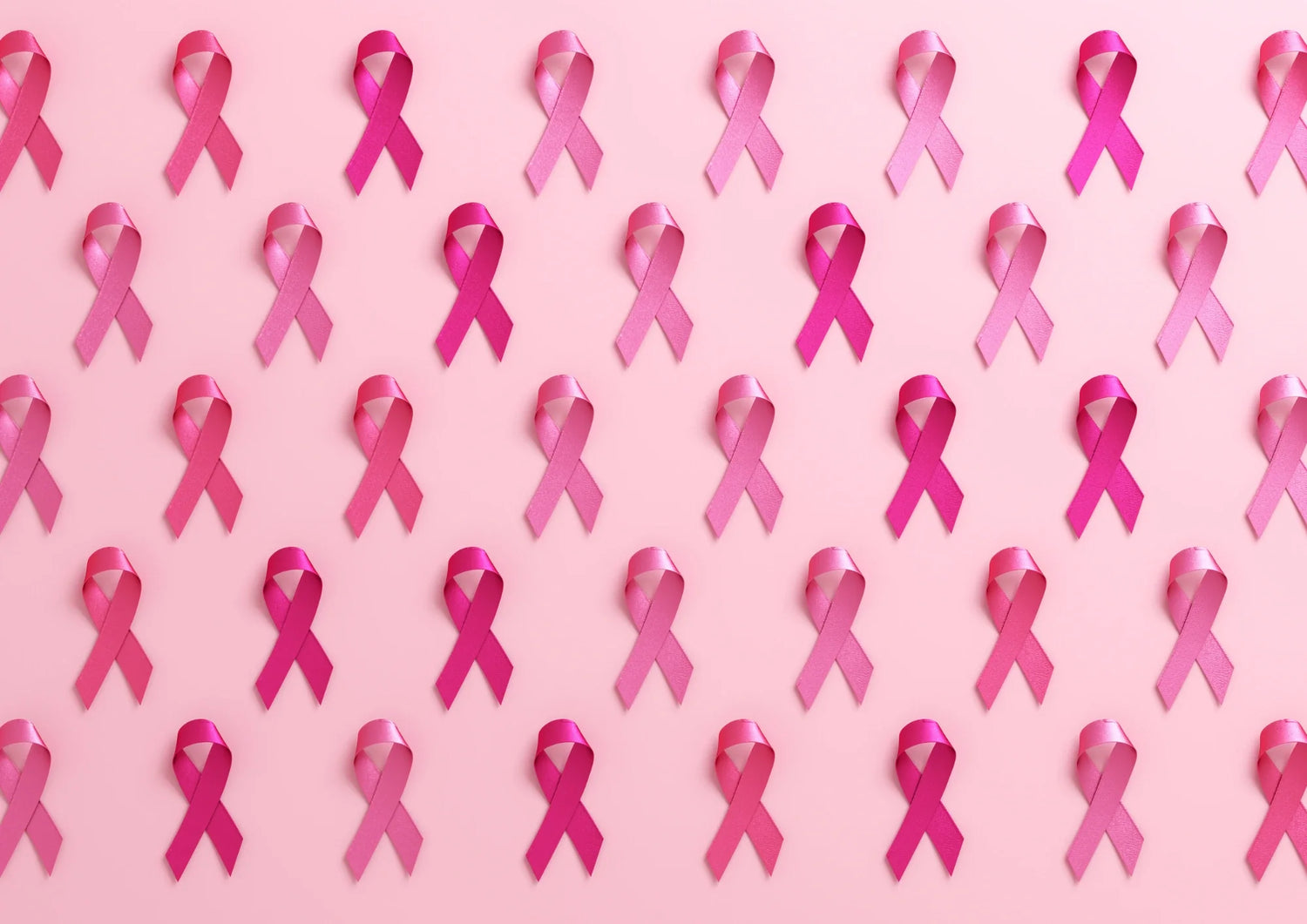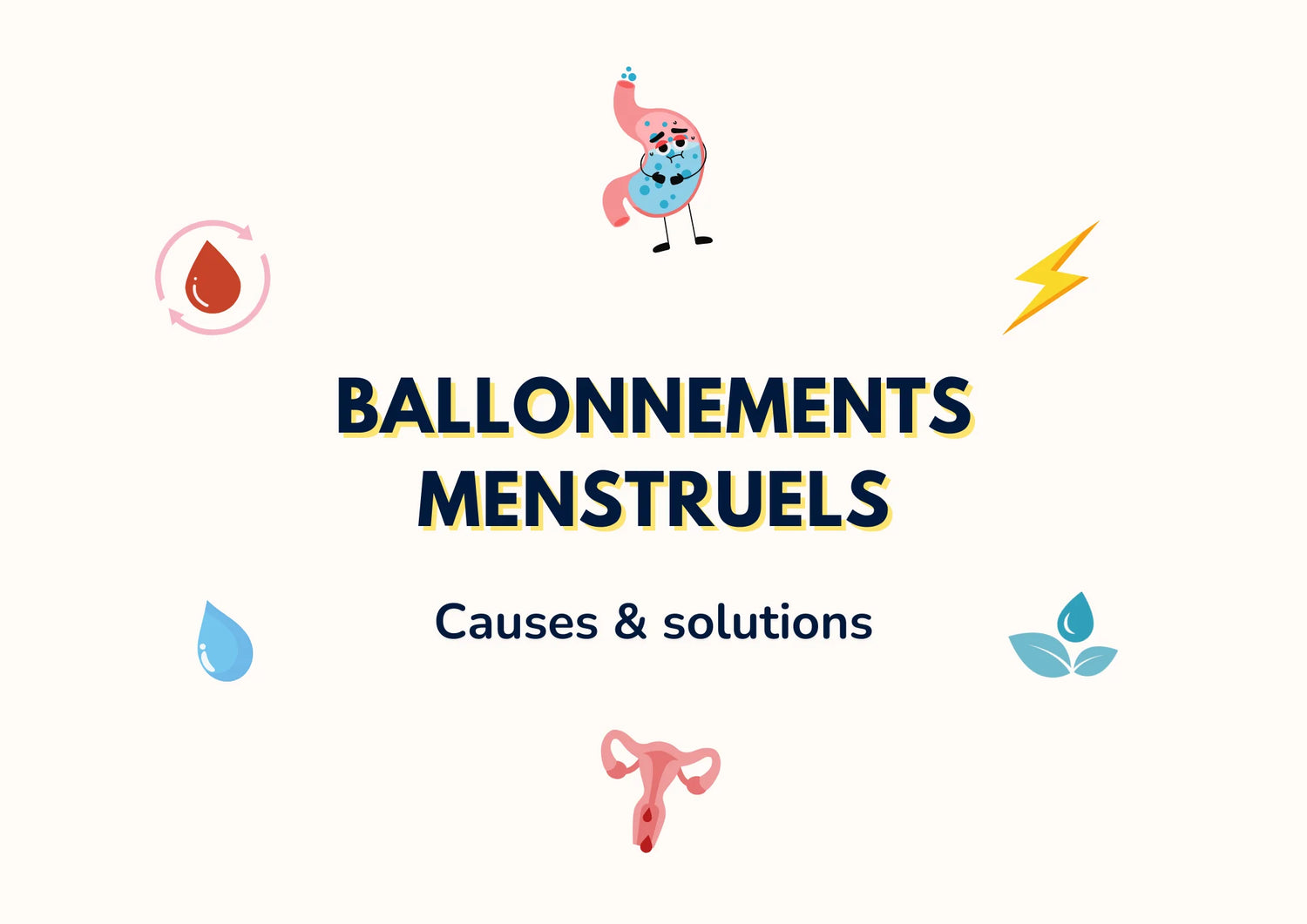Do you feel your stomach contracting? Apain appears on your back or thighs? Sometimes nausea or vomiting prevents you from getting up? What you are feeling is the menstrual pain.🩸
You have surely wondered why thewomen experience menstrual pain of varying intensity? And why theare periods also painful ?
In this article, we will explain what happens in women's bodies and how to better live through this period! 🤗
Summary
What is dysmenorrhea?
Before understanding where themenstrual cramps , it is important to put a word on what it is!
The medical term “dysmenorrhea" designates theintense painwho occurbefore and during menstruation.Even if themenstrual crampsare mundane, for some women it represents a real ordeal. When thesepain becomes a real disability : it is about dysmenorrhea.
There istwo types of dysmenorrhea. They do not have exactly the same origin, nor the same evolution over time:
-
Primary dysmenorrhea
who starts at the
first period and fades over time.
It is related tonatural uterine contractionsto expel the mucus, but sometimes these contractions are very intense or too frequent and causesevere pain.
Fromheavy flowcan accompany theprimary dysmenorrhea. The thicker the endometrium, the greater the production of prostaglandins can be, which increases both the amount of blood and the intensity of contractions.
-
Secondary dysmenorrheawhich appears later, at the age
adult
and which can hide certain pathologies such as
endometriosis , a
fibroid
(benign tumor that develops in the wall of the uterus) or be related to a
IUD
.
In these cases, the pains aremore intense and less easy to relievewith standard painkillers. They require appropriate treatment to soothe them!

In any case, even if these severe pains are "common," they are not normal: they are dysmenorrhea. If they prevent you from living normally, it is essential to talk to your doctor and discuss it with those around you! 😊
But then, are the pains you are feeling frommild menstrual crampsor from theredysmenorrhea? Let's see together what are thesymptoms of painful periods (or dysmenorrhea).
What are the symptoms of dysmenorrhea?
Now that we have understood what is thedysmenorrhea, let's see together how themenstrual pain manifest in our body. 😊Because having a stomach ache is often just the visible part of the iceberg!
First of all, themenstrual painare frequently preceded by the SPM (Premenstrual syndrome), a set of physical and emotional symptomswhich appear a few days before the period.
The SPMcausespainvarious, including bloating, chest pain, irritability or anxiety, as well as swelling in the hands or feet.
And yes, your body and mood change even before your period starts! 🩸
Then, when the period starts, the pain becomes more intense and is accompanied by other symptoms such as:
- Lower abdominal cramps,
- Back pain, especially in the lower back,
- Thigh or leg pain,
- Headaches or migraines,
- Digestive disorders
- Dizziness, feeling faint or general weakness,
- Mood swings, anxiety, or crying spells.
During themenstruation , the uterus contracts too strongly, which causes stronger pains such as headaches (nighttime and morning headaches), nausea, severe constipation or diarrhea, lower back pain, and frequent urination (very frequent urge to urinate) are common; vomiting is possible but less frequent.
Nevertheless, it is important to consult a healthcare professional for optimal support. The main thing is to find the solutions that suit you best! 😊 Your body reacts differently at each stage of your cycle, and that is perfectly normal. But why do you feel different pains, and where do they come from?
Pain during menstruation: what are the causes?
But then concretely, behind thesemenstrual cramps, what’s happening? 🤔
There is indeed a very specific mechanism inside our body. Every month, your uterus is preparing for a possible pregnancy. In the absence of fertilization, the endometrium (the uterine lining) detaches and is expelled: these are the rules.🩸
To facilitate this evacuation, your body produces hormones called prostaglandins. These will cause some uterine contractionsto expel the mucous membrane.
However, if they are produced in excess, these contractions become too strong and cut off the oxygen supply to the uterine muscle. And we know it, the pain occurs when a muscle is deprived of oxygen.
Result? Severe pain appears. ⚡️
Thesemenstrual crampscan be influenced by several factors:
- A hormonal imbalance (a sudden drop in estrogen and progesterone)
- Poor lifestyle habits (stress, lack of sleep, smoking, alcohol, poor diet…)
- Gynecological conditions such as endometriosis

This is not necessarily inevitable! It is being talked about more and more, especially thanks to the freeing of speech on the menstrual crampsand there media coverage of endometriosis .
So don't panic, there are solutions (natural or medicinal) to alleviate these pains! 💪 Although menstrual cramps are experienced differently for each woman , they strongly impact our daily lives. 😔
Painful periods: what impact on daily life?
As mentioned earlier, themenstrual crampsare normal, however someintense pain are not "just" a passing pain. They truly disrupt the daily lives of women. It is important to focus on their consequences. This happens to all women, and there are solutions to live through it better!
It is not always easy to concentrate at work or in school when your stomach is twisting in pain. Some days become a challenge: hard to stay standing, follow a class, or attend back-to-back meetings. 😅
Results? Many women push through or take a day off.
Going grocery shopping, taking care of the children, climbing stairs, or exercising becomes very exhausting. When themenstrual pain is intense, the body needs rest. Everyday life is not suited towomen suffering from dysmenorrhea.
As a result, some companies grant menstrual leave to women. This is characterized as a menstrual leave of 3 days prescribed by a doctor. However, in France, menstrual leave for women experiencing painful periods is not yet covered by any legislative provision.
Since 2021, it has been applied at the choice of businesses or local authorities. Thus, since June 1, 2023, people suffering fromsecondary dysmenorrhea entitles to a work stoppageexempt from waiting period, with no monthly or annual limit.
A real breakthrough for women, but it is not enough yet. That is why we will look at different solutions to relieve painful periods. 😊
What are the solutions to relieve painful periods?
It's true that thepainful rulesare not a walk in the park for women. But fortunately, there arenatural or medical solutions to relieve these pains!
We give you some simple but effective tips to regain a bit of serenity in case of painful periods:
- Adopt a healthy lifestyle: Eat a balanced diet, avoid coffee, tobacco, or alcohol. These substances will stimulate your nervous system, thereby intensifying pain and increasing irritability.
- Practice a physical activity: When you engage in physical activity, your body releases endorphins, those famous "happiness hormones," which act as a natural painkiller. They help reduce discomfort related to cramps and provide a pleasant feeling of relaxation.
- Apply heat: A hot water bottle and a warm bath are also your allies against cramps. Heat helps to relax the muscles and oxygenate them by dilating the tissues.
- Rest and relax: Sleep is the best remedy, listen to your body and get into cocooning mode! When you sleep poorly, your body produces more cortisol: the stress hormone that increases inflammation and promotes emotional fatigue.😖
- Wear loose clothing: This is the first step to feeling good during your period. Tight clothing will congest your lower abdomen and intensify the pain.
These few tips can help you torelieve menstrual cramps, but obviously if that is not enough, consult your doctor. They will be able to offer you aappropriate treatment: anti-inflammatory drugs, hormone therapy, or even additional tests if necessary.
But should you panic at the first signs of pain or wait for it to get worse?
Painful periods: should you be concerned?
You have probably been told: "It's normal to have pain during your period, it's part of the menstrual cycle for women." And yet, Having pain during your period is not normal.
Betweenmenstrual pain and dysmenorrhea , the line is fine, as we have seen previously. A consultation with a healthcare professional will help you see more clearly and find the appropriate treatment, but when and who should you consult? Some situations should not wait: if you experience one or more of the following symptoms, it is important to make an appointment with your doctor:
- You need to change your menstrual protection more than 6 times a day because of avery heavy flow.
- You feel aextreme fatigueor ofdizziness . These symptoms are not normal and should be examined.
- You have size fever , of the chillsor verythirst , this may be a sign of dehydration or infection.
- You have a doubt regarding a pregnancy, for example, missed periods, very light bleeding, or unusual pain.
These signs may indicate another condition, so do not ignore them! At the slightest doubt or question, consult your doctor. It is not a waste of time; you never consult for nothing, sometimes, just being reassured is enough. allows for better pain management . 🤗
No thepainful periods it's not just in your head! Between the dysmenorrhea,the associated symptoms or hormonal causes, each womanlives her period differently . But one thing is certain: you are not alone. 💪
There are solutions for alleviate these pains. Learn to listen to your body, talk about it, and consult a doctor. Take care of yourself and your menstrual health. 🌸



 https://mysorio.com
https://mysorio.com


